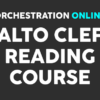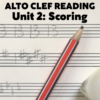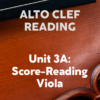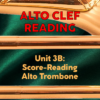8:38 p.m. I’m sitting in the rehearsal room, typing this as unobtrusively as possible as the LA Doctor’s Symphony Orchestra works out on the Elgar Enigma Variations. The rehearsal for my piece is well finished by now, but I’m just waiting for the break so that a few players can talk to me about bits and pieces in the score.
The run-through for my piece was, well, “okay.” That is to say, the conductor Ivan Schulman led the players with competence and sensitivity, and my soloist Christina Kopriva played phenomenally well. She could easily have gone pro, with a confident vibe and a great big sound. But it’s hard to truly tell how the concert will go at this point, as many members were missing from the ranks on this particular night. With one violist, no clarinets, and so on, certain elements aren’t supporting others, and at times the wispy texture falls apart.
There’s a real danger that I’ve overshot my goal here. That is to say, that I may have overestimated the amount of work that this orchestra is able to devote to preparing a work of this complexity. In this regard, the person bearing the most responsibility is me. It does little good to reproach the players in any way for a less successful effort. Especially in the case of this orchestra, which has shown a great deal of care and conscientiousness in learning the score within the limits that time and their other demanding careers provide.
After the run-through, I had a quick meeting off to the side with Christina, while the orchestra continued rehearsing the other items on the upcoming program. We discussed a few changes of tempo, and some flourishes here and there that needed adjusting. It looks like we’ll be meeting up with Ivan this weekend, to go over a few more concerns. That will be the best time to give him some notes. I’ll mention these in the diary after the meeting.
After running through the first few Enigma Variations of Elgar, the orchestra takes a break, and a few of the players want to chat with me. Some are just happy to be playing the work, and want to thank me for writing it. It’s nice to get some positive feedback, but what’s more important is answering some niggling questions from the players about this and that. As it turns out, there’s nothing more humbling to a detail-oriented orchestrator than to attend a rehearsal of his own work. I’m made aware of several rather bone-headed errors, like one in which I cut and pasted a bit of bass tremolo, and neglected to edit out the harmonic marking. Yes, Virginia, there is no way to play a double bass harmonic on F in the staff. The trombones also need some feedback, mostly just a caution not to double during marked solos (as the thickened tone is at odds with the orchestral texture and melodic interaction with other solos).
The main that that has concerned me all along is that the soloist is happy with the work, and that she is able to acquit herself with mastery. And that is absolutely the case. Christina is in control of the material, and giving it everything she’s got. I really wish I could help her find additional opportunities to perform this work, as she’s stellar at it. But the region where she’s about to do her residency, the American Southeast, is one in which I’ve got no connections as yet. There are other soloists I know from that area who I’d love to work with as well – but it may be awhile before I’m able to find a mutual opportunity.
Now it’s after midnight, and I’ve safely returned to my temporary digs and put myself to bed, and I’m just finishing up this entry. Was it worth it to fly all the way out here, just on the merits of this one concerto’s first performance? I would say, “yes” – even if the orchestral accompaniment hits some snags at the premiere. The soloist is doing a phenomenal job, and the musicians are totally behind the music. It’s icing on the cake that I’ll be able to catch up with some very important personal business, and do a little shopping for bargains here in Southern California.
Next on the list: get a phone! More tomorrow…








